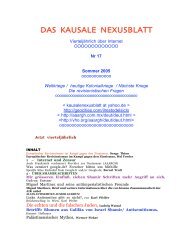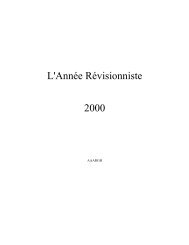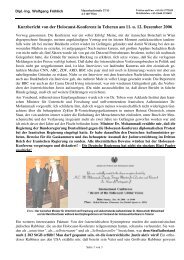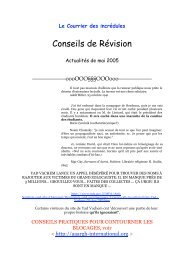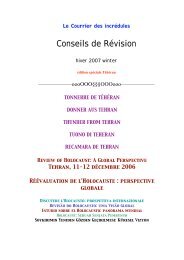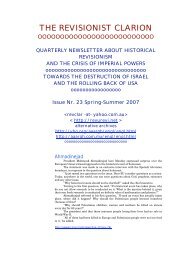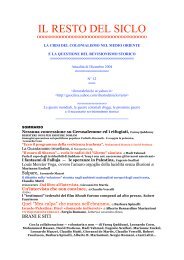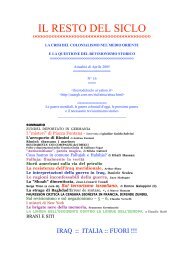Numéro 60--- ÃTà 2007 - Vho
Numéro 60--- ÃTà 2007 - Vho
Numéro 60--- ÃTà 2007 - Vho
You also want an ePaper? Increase the reach of your titles
YUMPU automatically turns print PDFs into web optimized ePapers that Google loves.
GAZETTE DU GOLFE ET DES BANLIEUES / <strong>60</strong> / ÉTÉ <strong>2007</strong><br />
seriously considering a proposal by President Vladimir Putin of Russia to suspend enrichment at<br />
least long enough to start serious negotiations with the United Nations.<br />
There have also been indications that the Iranians are willing to accept a compromise plan<br />
presented by Mohamed ElBaradei, the director general of the International Atomic Energy Agency.<br />
That plan calls for the suspension of all major enrichment activities but allows the regime to save face<br />
by keeping a handful of centrifuges in operation.<br />
The mullahs are keen on damage control on another front as well. After his meeting with<br />
Ayatollah Khamenei, Mr. Velayati announced that the Holocaust is a fact of history and chastised<br />
those who question its reality. Ali Larijani, Iran’s chief nuclear negotiator, also declared the<br />
Holocaust a “historical matter” to be discussed by scholars (and not, he implied, by ignorant<br />
politicians). In short, there is a new willingness among the Iranian political elite to avoid the rhetoric<br />
of confrontation and to negotiate.<br />
There are three ways to analyze this turn. Advocates of an American invasion of Iran say that<br />
last month’s strengthening of the American armada in the Persian Gulf has frightened the Iranian<br />
regime. What diplomacy could not do for years, a few destroyers did in less than a month. These<br />
advocates encourage more of the same, hoping either that the mullahs will accept defeat in the face of<br />
an imminent attack, or that a Gulf of Tonkin incident will lead to a full attack on Iran’s nuclear<br />
facilities.<br />
A second camp attacks the build-up of the armada as dangerous saber-rattling at best, and at<br />
worst as camouflage for already settled plans to attack Iran’s nuclear sites. Such an attack, they say,<br />
might provide a much-needed feather for President Bush’s empty cap at a time when his Middle East<br />
policy has manifestly failed. According to this camp, what changed the minds of Iranian officials was<br />
only the United Nations resolution threatening economic sanctions, and the possibility of other<br />
resolutions and more serious sanctions.<br />
Both camps are partly right and yet dangerously wrong. There is a third way of looking at the<br />
facts.<br />
The mullahs have historically shown an unfailing ability to smell out and, when pragmatic,<br />
succumb to credible power in their foes. Indeed, the presence of the American ships has helped<br />
encourage them to negotiate. But no less clear is the fact that the mullahs’ attitude change began in<br />
late December, when the United Nations Security Council finally passed a resolution against the<br />
regime in Tehran.<br />
The passage of the resolution hastened the demise of President Mahmoud Ahmadinejad’s<br />
confrontational approach to the West. And the falling price of oil, leading to declining revenues for<br />
the regime, magnified the resolution’s economic impact. Top leaders of the Islamic Republic, from<br />
Ayatollah Khamenei to Mr. Rafsanjani, have made it clear that they consider sanctions a serious<br />
threat — more serious, according to Mr. Rafsanjani, than the possibility of an invasion.<br />
In other words, what the unilateral and increasingly quixotic American embargo could not do<br />
in more than a decade, a limited United Nations resolution has accomplished in less than a month.<br />
And the resolution succeeded because few things frighten the mullahs more than the prospect of<br />
confronting a united front made up of the European Union, Russia, China and the United States. The<br />
resolution was a manifestation of just such a united front.<br />
While the combination of credible force, reduced oil prices and a United Nations resolution<br />
has worked to create the most favorable conditions yet for a negotiated solution to the nuclear crisis,<br />
any unilateral American attack on Iran is sure to backfire. It will break the international coalition<br />
against the Islamic Republic’s nuclear adventurism; it will allow China, Russia and even some<br />
countries in Europe to legitimately side with the mullahs; it will lead to higher oil prices and an<br />
increase in Iranian government revenues; and finally, it will help revive the waning power of the<br />
warmongers in Tehran.<br />
Those convinced that only the combination of credible might and diplomatic pressure will<br />
work worry rightly that the Bush administration, frustrated by its failures in Iraq and goaded by<br />
hawks in Washington, will do to Iran what it did to Iraq. In confronting Saddam Hussein and the<br />
threat of his weapons of mass destruction, the Bush administration insisted that amassing an armada<br />
in the Persian Gulf was necessary to frighten Mr. Hussein into submission. But once the armada was<br />
in place, they used it to carry out a long-ago planned invasion of Iraq.<br />
Today, many worry that the plans for an invasion of Iran, too, were made long ago, and that<br />
the armada is there to make possible either another Gulf of Tonkin resolution or an Iranian act of<br />
provocation against American forces, which could then serve as an excuse for an attack on Iran.<br />
War and peace with Iran are both possible today. With prudence, backed by power but guided<br />
by the wisdom to recognize the new signals coming from Tehran, the United States can today achieve<br />
a principled solution to the nuclear crisis. Congress, vigilant American citizens and a resolute policy<br />
— 55 —



